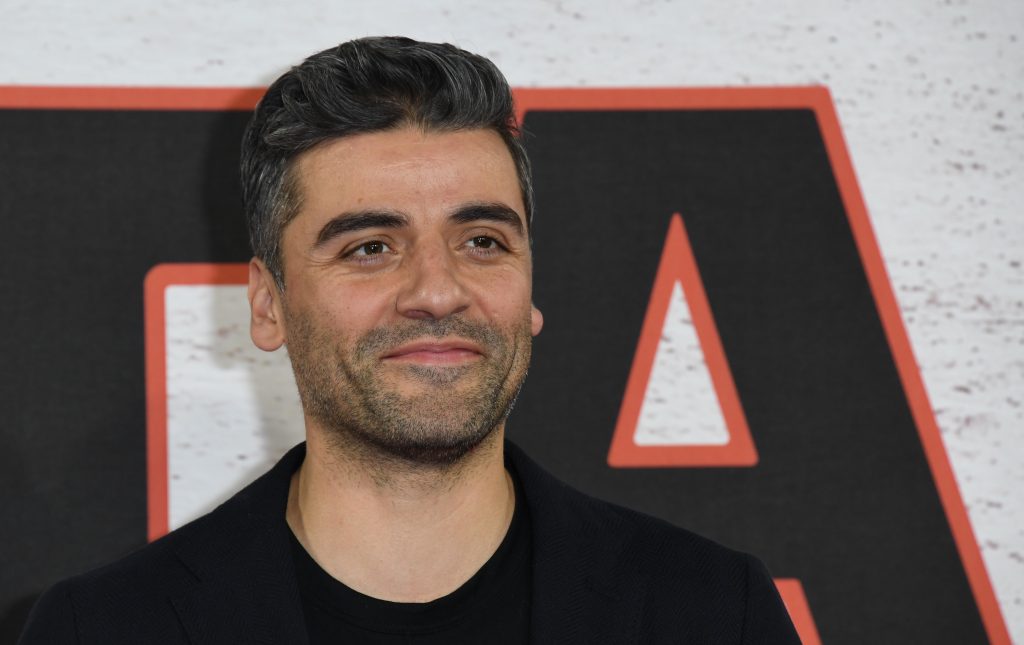Oscar Isaac filmed Alex Garland’s Annihilation and Star Wars: The Last Jedi at the same time. That meant he’d often have to jump out of his X-Wing as Poe Dameron, take off his blaster, and run across Pinewood Studios, tussle his hair, change into some camo pants and be Kane, the only guy who’s ever come back from the mysterious Area X. The two projects couldn’t have been more different but that sense of dislocation actually helped the Guatemalan-Cuban-American actor get in character as he re-teamed with his Ex-Machina director. “I was off in this other, crazy world and just dipping into this one for a moment,” he told Remezcla, and “that actually mirrored the character of Kane. He’s this spectral figure that’s both there and also not there.”
When Kane shows up at at home unaware of how he even got there and later falls ill, his wife, Lena, sets out to find out more about what happened to him in the months when he was gone. Lena (played by Natalie Portman) eventually learns about Area X, a shimmering environmental phenomenon that no amount of government scientists and physicists can explain. It doesn’t help that every research group they’ve ever sent in has failed to come back – until Kane, that is. And so, Lena joins Dr. Ventress (Jennifer Jason-Leigh) and three other women (Tessa Thompson, Gina Rodriguez, Nina Novotny) to head into Area X to see firsthand what it is that took her husband from her and returned him a shell of a man. Slowly, we too learn what it is Kane and his fellow men went through even as the dangers of Area X risk taking a toll on this latest quest, making us wonder whether these women will survive this all but suicidal mission.
Acknowledging that what attracted him to this project was the chance to work with Garland again, Isaac also talked about how he’s drawn to the ways sci-fi can speak to big ideas in ways other genres can’t. “With Ex-Machina and Annihilation, you just have the opportunity to talk about very deep – difficult to speak of – human things. There’s a way of presenting them that allows you to explore those things in a pretty wild way, by making an allegory. Sci-fi is always about us. Even if it’s aliens, it’s about humans. There’s an opportunity there for a lot of poetry in sci-fi.”

“I think it’s important for people to see Latinos of every color playing everything.”
As for what that looks like in Annihilation, Isaac mused on the concept of self-destruction: “All of us have a potential but a tendency towards self-destruction. Sometimes it’s not so intense. It’s just like, Oh, I drink a little too much! Or, you get a little aggressive with these things. But some people go even further. So why do they mess up that great job they have or that relationship? What is it? It’s an exploration of that,” posing it in ways both philosophical and biological: “Is it at the cellular level?”
Lest the film sound too intellectual, Isaac was quick to point out how the stakes are very much rooted in these characters’ lives. “What I loved about the movie is, at the heart of it, is the death of a marriage and how you come out of the other side of that.” The estrangement between Kane and Lena may be framed in near-cosmic terms, but at its core is a much more simple inquiry, wondering whether two people can build a marriage anew after changing and nearly destroying who they were together.
Being one of the most recognizable Latino faces in Hollywood today, Isaac has made an entire career of playing an enviable number of roles where his heritage is a negligible aspect of his characters. The fact that someone like Kane could be Latino, though there’s nothing on-screen that would suggest nor deny it, shows a kind of progress. “Latinos are a diverse community,” he explained, “and I think it’s important for people to see Latinos of every color playing everything” without needing to explain their background.
“Early on in my career, that was always the go-to thing. It’s like, We’re casting you, but now we want to make sure to telegraph to everyone why we cast you by making it clear that you have this name, and you should speak Spanish.” He admits, though, that he’s aware how important that more explicit version of representation can be in this day and age. It’s why he’d love to be able to do a film all in Spanish sometime in the future (“Like, working with Pedro Almodóvar is one of my big dreams,” he confessed) and why he actually pushed to make his character in an upcoming project, which wasn’t written as Latino, actually be from South America where it takes place.
“For me, it has to be rooted in the story. Not just this representational idea. I think that’s important to think about for people putting movies together: As an actor I want to be cast not for my representational quality but for my transformative quality.”
Annihilation opens in theaters on February 23, 2018.







